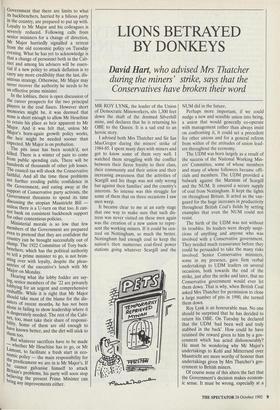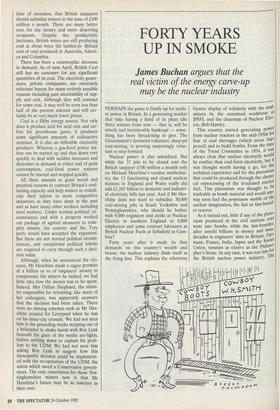LIONS BETRAYED BY DONKEYS
David Hart, who advised Mrs Thatcher
during the miners' strike, says that the Conservatives have broken their word
MR ROY LYNK, the leader of the Union of Democratic Mineworkers, sits 1,300 feet down the shaft of the doomed Silverhill mine, and declares that he is returning his OBE to the Queen. It is a sad end to an heroic story.
I advised both Mrs Thatcher and Sir Ian MacGregor during the miners' strike of 1984-85. I spent many days with miners and got to know some of them very well. I watched them struggling with the conflict between their fierce loyalty to their class, their community and their union and their increasing awareness that the activities of Scargill and his thugs was not only wrong but against their families' and the country's interests. So intense was this struggle for some of them that on three occasions I saw men weep.
It became clear to me at an early stage that one way to make sure that such dis- tress was never visited on these men again was the creation of a new union to repre- sent the working miners. If it could be cen- tred on Nottingham, so much the better. Nottingham had enough coal to keep the nation's then numerous coal-fired power stations going whatever Scargill and the NUM did in the future.
Perhaps more important, if we could nudge a new and sensible union into being, a union that would generally co-operate with management rather than always insist on confronting it, it could set a precedent for other unions and for a general reform from within of the attitudes of union lead- ers throughout the economy, The UDM was born largely as a result of the success of the National Working Min- ers' Committee, some of whose members and many of whose followers became offi- cials and members. The UDM provided a bulwark against the Marxism of Scargill and the NUM. It ensured a secure supply of coal from Nottingham. It kept the lights on throughout Britain. It acted as the van- guard for the huge increases in productivity throughout British Coal's fields by setting examples that even the NUM could not resist.
The birth of the UDM was not without its troubles. Its leaders were deeply suspi- cious of anything and anyone who was involved with a Conservative government. They needed much reassurance before they could be persuaded to take the many risks involved. Senior Conservative ministers, some in my presence, gave firm verbal undertakings to UDM leaders on several occasions, both towards the end of the strike, just after the strike and later, that no Conservative government would ever let them down. That is why, when British Coal asked Mrs Thatcher for permission to close a large number of pits in 1990, she turned them down.
Roy Lynk is an honourable man. No one should be surprised that he has decided to return his OBE. On Tuesday he declared that the UDM tad been well and truly stabbed in the back'. How could he have retained the reward given to him by a gov- ernment which has acted dishonourably? He must be wondering why Mr Major's undertakings to Kohl and Mitterrand over Maastricht are more worthy of honour than undertakings given by Mrs Thatcher's gov- ernment to British miners.
Of course none of this alters the fact that the Government's decision makes econom- ic sense. It must be wrong, especially at a time of recession, that British taxpayers should subsidise miners to the tune of £100 million a month. There are many better uses for the money and more deserving recipients. Despite the productivity increases, British mines are still producing coal at about twice the landed-in- Britain cost of coal produced in Australia, Ameri- ca and Columbia.
There has been a catastrophic decrease in demand. As of next April, British Coal still has no customer for any significant quantities of its coal. The electricity gener- ators, private companies, are extremely reluctant buyers for many entirely sensible reasons including past unreliability of sup- ply and cost. Although they will contract for some coal, it may well be even less than half of the present amount and will cer- tainly be at very much lower prices.
Coal is a filthy energy source. Not only does it produce acid for acid rain and car- bon for greenhouse gases, it produces some significant amounts of radioactive uranium. It is also an inflexible electricity producer. Whereas a gas-fired power sta- tion can be started up and shut down very quickly to deal with sudden increases and decreases in demand at either end of peak consumption, coal-fired power stations cannot be started and stopped quickly.
All these amount to good moral and practical reasons to contract Britain's coal- mining capacity and help miners to rededi- cate their talents to more competitive industries as they have done in the past and as have many other workers including steel workers. Under normal political cir- cumstances and with a properly worked out package of agreed measures to rede- ploy miners, the country and the Tory party would have accepted the argument. But these are not normal political circum- stances, and exceptional political talents are required to carry through such a deci- sion today.
Although, when he announced the clo- sures, Mr Heseltine made a vague promise of a billion or so of taxpayers' money to compensate the miners he sacked, we had little idea how the money was to be spent. Indeed, Mrs Gillian Shephard, the minis- ter responsible for retraining, like many of her colleagues, was apparently unaware that the decision had been taken. There were no shining schemes such as Mr Hes- eltine created for Liverpool when he was on his inner-city crusade. We had not seen him in the preceding weeks stepping out of a helicopter to shake hands with Roy Lynk beneath the glare of the media arc-lights, before settling down to explain his prob- lem to the UDM. We had not seen him asking Roy Lynk to suggest how this Inescapable decision could be implement- ed with the co-operation of the UDM, the union which saved a Conservative govern- ment. The only consolation for those Not- tinghamshire miners now is that Mr Hese!tine's future may be as insecure as their own.



































































 Previous page
Previous page